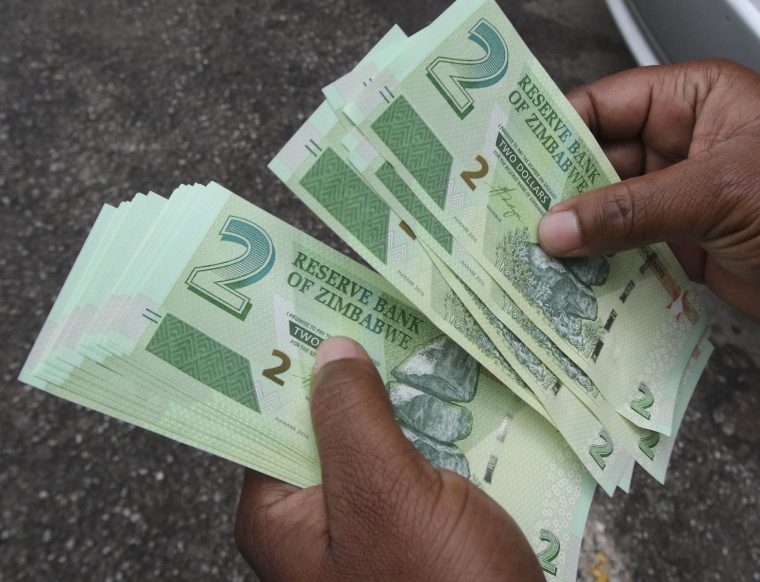Inflation eases as prices stabilise, Zim-dollar strengthens
ZIMBABWE’S month-on-month inflation rate stood at 8,44 percent in August after a drastic depreciation by 27,09 percentage points on the July rate of 35,53 percent, showing that stability of the foreign exchange rate is bearing fruit on the pricing front.
Latest data released by the Zimbabwe National Statistics Agency (Zimstat) this Tuesday, shows the month-on-month inflation rate has eased, and experts link this development to Government’s recent monetary policy measures.
“This means that prices as measured by the all items Consumer Price Index increased by an average rate of 8,44 percent from July to August 2020,” said Zimstat.
The agency has further shown that year-on-year inflation rate for the month of August 2020, as measured by the all items Consumer Price Index (CPI), stood at 761,02 percent.
“This means that prices as measured by the all items CPI increased by an average of 761,02 percent between August 2019 and August 2020,” it said.
Since the introduction of the weekly forex auction trading system, the Zimbabwe dollar has for the past three weeks been appreciating with the exchange rate this week settling at US$1:$81,71 gaining 0,98 points from the previous week’s 82.69.The Reserve Bank of Zimbabwe introduced the weekly foreign currency auction trading system on June 23 replacing the fixed exchange rate of US$1:$25.
The interventions on the forex trading market have received widespread stakeholder endorsement and are being complemented by tight money supply control measures.
These include restoration of sanity in the mobile money sector, which has recently been blamed for fuelling black market exchange distortions. Following adoption of these measures price escalation has halted. For instance basic goods such as sugar and cooking oil have remained stable at between $212 and $220 for a 2kg packet while cooking oil 2 ltrs is pegged at between $249 and $280 and roller meal 10kg at between $330 and $375. Bread has also remained stagnant at between $66 to $68. In some shops peanut butter 375mls is now pegged at $160 from about $200. Major retail shops like OK have also been running promotional programmes to entice consumer spending. The prevailing stability is a reprieve to consumers, whose disposable incomes have remained below the Poverty Datum Line (PDL), which measures the basic needs for an average family of five. As at June the PDL had risen by 33,6 percent to $11,333 from $8,483 the previous month.
Commenting, financial market analyst, Mr George Nhepera, said the huge decline on the month-on-month inflation rate was an indicator of positive improvement in the macro-economic climate, brought about by a stable exchange rate following the adoption of the foreign currency auction trading system. The volatility of the exchange rate has in the past has been blamed for triggering price hikes.
“The main cause of such a massive decline in my view is the strong sense of stability we have achieved related to the exchange rate during the period under review,” he said.
“This also include a general expectation now in the minds of both the public and business that the economy has since started to recover after the period of recession induced by Covid-19 and strict lock down rules.”
Mr Nhepera projected that inflationary pressures would continue decreasing further as long as the country maintains consistency on inter-related policies.
“The declining trend is most likely to continue well into future as long as we continue to maintain a cocktail of interrelated policies such as tight monetary policy, strict rules and regulations on mobile money system, import substitution to reduce demand for imports as well as incentives to increase our exports of minerals and agricultural products,” he said.
Mr Nhepera said Government and the private sector should continue to dialogue regularly on issues related to further stimulating the economy such as tax reductions on both individual incomes and corporate profits including negotiating massive investment deals with industrialised nations.
“Now is the time to move with speed to improve our relations with other countries mainly on the economic front, with one voice,” he said.
Posting on his official Twitter handle Permanent Secretary in the Ministry of Information, Publicity and Broadcasting Services Mr Nick Mangwana said: “August Consumer Price Index (CPI) has declined from 35 percent month-on-month to 8,4 percent.
“The blended rate is now 1,4 percent. We are on our way to victory in the war against inflation thanks to the stabilisation of the exchange rate.”
Finance and Economic Development Minister Professor Mthuli Ncube is on record saying the fiscal and monetary policies being implemented were stabilising the exchange rate and keeping inflationary pressures under check.
The net effect of rising inflation in the past has been that it continued to limit options for consumers who were suffering diminishing spending power as prices kept increasing in response to changes on the exchange rate. – chronicles











